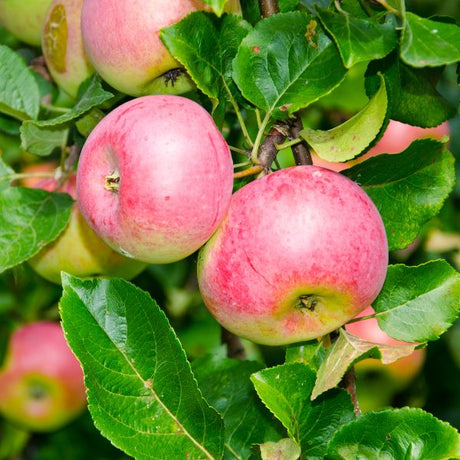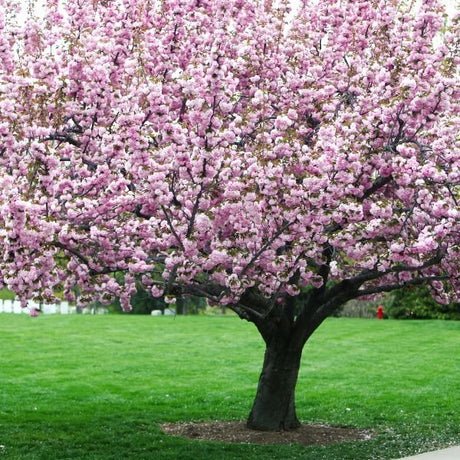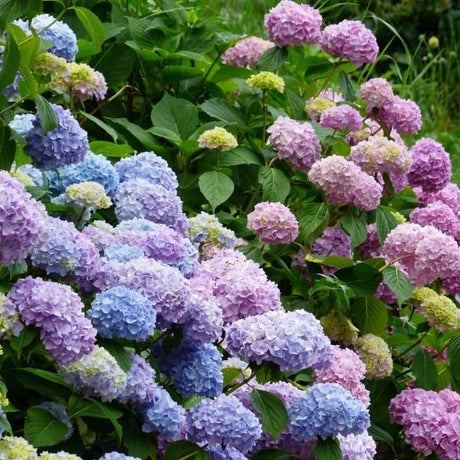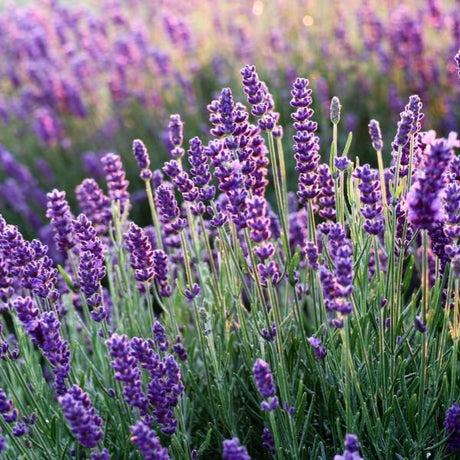Kentucky Coffee Tree
- Stay Protected with Plant Sentry ™
Kentucky Coffee Tree - #3 Container is backordered and will ship as soon as it is back in stock.
Plant Sentry™
Plant Sentry™
Plant Sentry is designed to protect both consumers and the nursery trade from invasive plant pests and diseases. Sites that display the Plant Sentry protection badge are protected from consumers buying and nurseries shipping material carrying invasive pests and diseases.
This proprietary eCommerce software prevents the shipment of a restricted plant to each state. The Plant Sentry system includes a shipment certification program. The Plant Sentry Compliance Officer works closely with NatureHills.com and each nursery or fulfillment center to ensure only compliant plants are sold to customers.
Click Here to learn more

Delivery and Shipping
Delivery and Shipping
Shipping
To obtain a more accurate shipment time-frame, simply enter your zip code in the “Find Your Growing Zone” box to the right. Our plants are grown all over the country and lead time on items may be different because of this. Once your order is placed, you will also receive the specific shipment time-frame information as part of your order confirmation. Once an item ships, you will receive shipment notification and tracking numbers, so you can follow along while your plant travels to your doorstep. We use FedEx, UPS, or USPS at our discretion.
Due to winter weather we have put a hold on shipping to the areas shown below in grey. You can still order now and we will ship the plant to you during an appropriate time for your zone.
Standard Shipping Rates
At Nature Hills we handle, package and ship the products you order with the utmost care to ensure healthy delivery. Shipping and handling charges are calculated based on the tables below. Please note that some items include an additional handling surcharge, these will be noted on the item's product page.
| From | To | S&H |
|---|---|---|
| $0 | $19.99 | $24.99 |
| $20 | $49.99 | $29.99 |
| $50 | $69.99 | $34.99 |
| $70 | $99.99 | $39.99 |
| $100 | $129.99 | $44.99 |
| $130 | $149.99 | $48.99 |
| $150 | $150+ | Approx 28% |
Click here to see our full rates
Buying Options for Plants
Nature Hills sells a large variety of plants with several options available. Plants are offered in both potted containers and as dormant bare root without soil. Here is a helpful resource to understand your options as you create a beautiful landscape with help from Nature Hills.
Ever wonder what a larger plant will mean for your landscape? Container Sizes are really all about the age of the plant!
Seasonally, Nature Hills offers hand selected, high quality bare root trees, shrubs and perennials. Bare root plants are sold by height from the top of the root system to the top of the plant. Plants may be taller than the height minimums.
- Popular sizes of select trees are 1 foot, 2 feet, 3 feet, etc.
- Popular sizes of select bare root plants is 1 foot, 18 inches, etc.
Nature Hills Container Size by Volume
Keep in mind, specific varieties and different growing conditions can affect the rate at which plants grow. Variations in size may occur.
| Young Plants to 18 Months | ||
|---|---|---|
| Size | Volume | |
| 2"x2"x3" | Ranges from | .18 to .21 dry quarts / .198 to .23 dry liters in volume |
| 4.5" Container | Equal to | .65 dry quart / .72 dry liter in volume |
| Sprinter Pot | Equal to | .63 dry quart / .69 dry liter in volume |
| 4" Container | Ranges from | .31 to .87 / .35 to .96 dry liter in volume |
| 6" Container | Equal to | 1.4 dry quarts / 1.59 dry liters in volume |
| 1 Quart | Equal to | 1 dry quart / 1.1 dry liter in volume |
| 5.5" Container | Equal to | 1.89 of a dry quart / 2.08 dry liters in volume |
| 4"x4"x5" | Ranges from | .8 to 1.1 dry quarts / .88 to 1.2 dry liters in volume |
| 4"x4"x6" | Ranges from | 1.0 to 1.3 dry quarts / 1.1 to 1.41 dry liters in volume |
| 4"x4"x9" | Ranges from | 1.1 to 2.1 dry quarts / 1.2 to 2.3 dry liters in volume |
| 4"x4"x10" | Ranges from | 1.7 to 2.3 dry quart / 1.87 to 2.53 dry liters in volume |
| Plants 18 Months - 2.5 Years Old | ||
|---|---|---|
| Size | Volume | |
| 2 Quart | Equal to | 2 dry quarts / 2.2 dry liters in volume |
| #1 Container | Ranges from | 2.26 to 3.73 dry quarts / 2.49 to 4.11 dry liters in volume |
| 5"x5"x12" | Equal to | 3.5 to 4.3 dry quarts / 3.85 to 4.74 dry liters in volume |
| Plants 2 - 4 Years Old | ||
|---|---|---|
| Size | Volume | |
| #2 Container | Ranges from | 1.19 to 1.76 dry gallons / 5.24 to 7.75 dry liters in volume |
| #3 Container | Ranges from | 2.32 to 2.76 dry gallons / 10.22 to 12.16 dry liters in volume |
| Plants 3 - 5 Years Old | ||
|---|---|---|
| Size | Volume | |
| #5 Container | Ranges from | 2.92 to 4.62 dry gallons / 12.86 to 20.35 dry liters in volume |
| #6 Container | Ranges from | 5.25 to 6.01 dry gallons / 23.12 to 26.42 dry liters in volume |
| #7 Container | Ranges from | 5.98 to 6.08 dry gallons / 26.34 to 26.78 dry liters in volume |
Plant Highlights
Kentucky Coffee Tree highlights at a glance!
Plant Highlights
Plant Highlights
-
Brand
-
Botanical Name
-
Growing Zones
-
Mature Height
-
Mature Spread
-
Sun ExposureFull Sun
-
Moisture
-
Soil
-
Growth RateFast, Medium
-
Flower Color
-
Fall Color
-
Pollinator Friendly
-
Pollinator Required
-
Bloom PeriodLate Spring
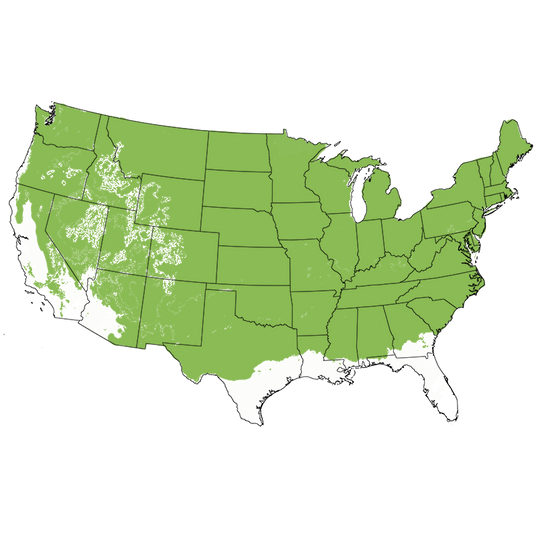
Growing Zones 3-8
Fascinating Native Kentucky Coffee Tree
- Native Tree
- Historically Important
- Excellent Urban Shade Tree
- Energy Conservation Tree
- Drought and Pollution Tolerant
- Hardy Tree
- Handles Wet or Dry Soils
- Good Storm and Wind Resistance
- Narrow Habit
- Huge, Blue-Green Compound Leaves
- Large Leaves Fall Early for Easy Fall Clean-Up
- Casts Dappled Shade
- Easy to Grow Other Plants Underneath
- Ornamental Tree with Winter Interest
Every tree is a treasure, and Kentucky Coffee Tree (Gymnocladus dioicus) is no exception. Did you know that ancient mammoths used to feed on the 10 inch long seed pods displayed on the female trees?
Yes, mammoths! Imagine growing an interesting native tree that used to be spread by munching mammoths.
Perhaps you remember playing with the round, brown “coffee beans” as a child. The Native Americans used them in games of chance and for jewelry. Settlers roasted and ground the female seeds as an admittedly poor substitute for coffee.
Kentucky Coffee Tree used to cover a wide swathe of the central and eastern United States. But nowadays, it’s rare. This tree deserves a close look by modern property owners.
These large growing, urban-savvy shade trees have no insect or disease problems. The wood is tough, and displays a remarkable lack of twiggy, fine branches. It withstands storms and pollution.
They are drought tolerant and widely adaptable to many soil types. It thrives in wet soil, or dry.
Female trees bloom star-shaped, greenish-white flowers that cascade from the branches. You’ll love the rich, Rose scent of these tiny blooms.
And the leaves are the largest of all of our native trees. Huge, bipinnately compound leaves can grow up to 3 feet long! They may be comprised of over 100 small “leaflets”.
They add a beautiful, fine-textured charm in the growing season. The young leaves display bronze, but age to a wonderful, dark green with a bluish overcast.
Kentucky Coffee Tree casts a delicious, dappled shade that is very restful, never gloomy. You can grow flowering shrubs, spring-flowering bulbs and perennials underneath without any problem.
The large leaves can develop yellow fall color. They drop all at once in early autumn, which makes for an easy fall cleanup.
Without fine, twiggy branching, the tree displays a wonderfully open growth habit. It forms a narrow silhouette with a rounded crown in the winter landscape.
Furrowed, dark brown bark, and the bare branches make this tree an incredible addition to a winter landscape. Female trees add the unique pods that decorate the bare branches all season.
And you won’t have to worry about these rugged trees. In fact, urban municipalities are turning more and more to the bold charm of the Kentucky Coffee Tree.
After all, they are looking for drought tolerant, strong trees for shade and street use. Watch for them in your local parks and thoroughfares.
For a beautiful tree with unique features and a hardy disposition, the Kentucky Coffee Tree is an excellent choice. Order yours today, and help bring this rare tree back!
How to Use Kentucky Coffee Tree in the Landscape
This tree is wonderful for energy conservation. The large leaves shield your house from the heat of the summer, but fall cleanly and early in autumn. You’ll enjoy every bit of warmth generated by the winter sun.
They make great street trees, with tough wood that withstands storms. Large commercial properties should add this tree, and many other native trees, shrubs and perennials. Advertise your corporate initiatives to generate interest and new business.
Kentucky Coffee Tree (sometimes spelled Kentucky Coffeetree) makes a wonderful delineation between rough woods and manicured landscape. Run a naturalized grouping along the border, and vary the spacing between trees.
Create a grove by planting 3 or 5 of them in a gentle zig-zag planting pattern. Far better to use unequal, isosceles triangles (avoid equilateral triangles) for the most natural look.
Underplant them with Paw Paws, Redbud, Chickasaw Plums or Flowering Dogwood trees. Chokeberry shrubs would make a terrific partner plant. It can be grown near Black Walnut.
Include them in windbreaks and shelterbelts. The large leaves blow and sway in the wind, adding a tropical flair. Think of them as “native Palm trees”, and you’ll get the picture.
Use in low-lying Rain Gardens to filter water runoff from roofs and roads. Or, add them to dry areas that require drought tolerant plants.
If you have a hankering for wildcrafting, please note that the seeds should be roasted, and not eaten raw. Fence in fruiting, female trees, if they are used near livestock.
The reddish-brown wood is rot-resistant and used for fence posts, railway sleepers, cabinets, paneling and fine furniture. It makes good firewood with high heat and low sparks, as well.
#ProPlantTips for Care
Kentucky Coffee Tree prefers moist, rich, well-drained soils. However, it is extremely adaptable to most soils. It becomes very drought tolerant once established.
It is fast-growing while young. Prune to develop a strong structure in winter or early spring. Plant it in full sun for best results.
Enjoy these tough, unusual, interesting, historical native tree! Order your Kentucky Coffee Trees today.






